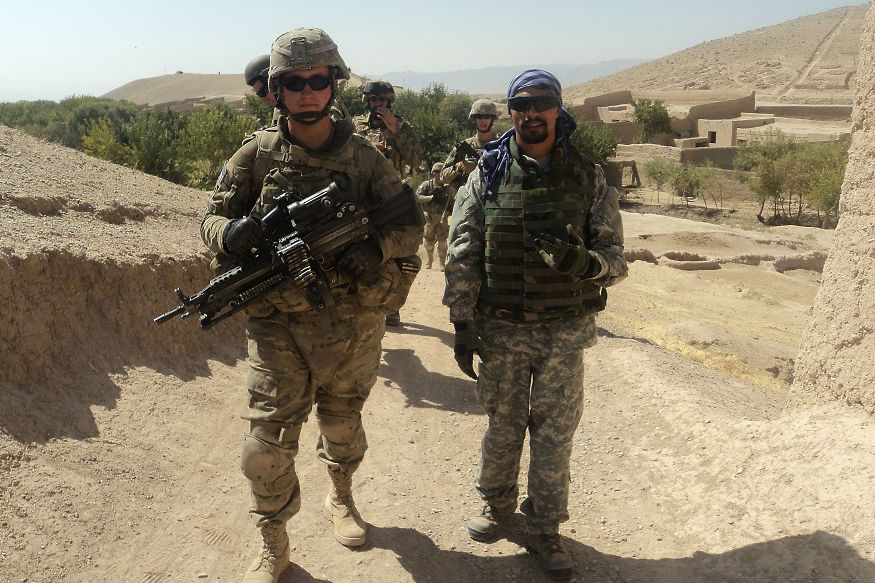As Canada opens its doors to thousands of Syrian refugees, a young Afghan man who says he risked his life to help Canadians fears he’s been left behind to face a certain death.

Sajad Kazemi worked as an interpreter with the Canadian Forces in Afghanistan, but missed the visa process offered to linguists. Now he claims he’s been left behind and hopeless in Kabul, awaiting a certain fate.
“My future is not guaranteed here,” he said. “I know I will get killed here, 100 per cent.”
The 28-year-old recently left his job and spends most of his time hiding indoors, especially after he says masked gunmen tried to kill him on his birthday just two weeks ago. He’s convinced that his days are numbered and is desperate for a chance to reach safety in Canada.
“I’d prefer living in a prison in Canada, it’s better than being killed here for no reason.”
Kazemi says he served with the Canadian Forces in Afghanistan in 2009 and 2010. The Canadian Forces, when asked, did not confirm Kazemi worked as an interpreter. But Kazemi showed Global News certificates and a letter of commendation for his dedication, “selfless efforts” and willingness “to risk life and limb.”
But because he was out in the field, he says he didn’t learn about Ottawa’s now-closed Special Immigration Measure for Afghans who were at “individual risk” resulting from their service with Canada’s military.
That visa process ended in 2011, but Kazemi is pleading with Ottawa to give left-behind linguists another chance.
“I am asking the Canadian government to restart the visa process, and not just for me but for other linguists who are left behind,” he said. “You can accept 25,000 Syrians… and their lives are threatened,” he says. “What about 100 Afghan people whose lives are at risk? Are you just going to turn your backs on us or forget us?”
Interpreters are marked men in Afghanistan. Kazemi says they’re referred to as “infidels” and that insurgents will pay thousands of dollars for the opportunity to exact gruesome vengeance on those who helped fight against them.
“The Taliban or insurgents are buying interpreters … the amount for one linguist is around US$50,000. One of the linguists was beheaded; they put his body on the highway and his decapitated head on his chest.”
Kazemi knew working with the military meant he could by maimed or killed in battle, but the job brought additional risks once insurgents learned he was working with western forces.
“They said ‘We’re going to kill your family,’” he said. “But I did not quit my job because I was dedicated to my employer and Canadian mentors; they were really kind to me. We had great times, we were achieving our missions. I really love military life, but I don’t like innocent people being killed. I just don’t like the terrorists, they’re ruining our society.”
The family fled to Kabul instead, although Kazemi says his life is still at risk.
Toronto immigration lawyer Michael Niren says Ottawa’s immigration program was a “failed project” and that Kazemi has only a “very dim” chance of seeing the process reopened, particularly with attention focused on whether the Liberal government will meet its immigration goals for fleeing Syrians.
“It’s a tragic situation,” he said.
“Everything’s been overshadowed by the Syrian refugee crisis. I think the government has over-promised and will under-deliver, and so cases like this will be further dismissed because of what’s going on.”
Immigration and Citizenship Minister John McCallum refused to comment on this story.
An emailed statement from his office said “The government recognizes that these brave and courageous Afghans who worked for us made a significant contribution to our mission, and saved Canadian lives,” but added that Ottawa does not plan to reopen the visa process.
READ MORE: More Canadian cities request pause in refugee flow
Instead, the email said Kazemi should apply for a refugee visa, to which Niren says “good luck.”
“It’s not easy just because he’s from a refugee-producing country,” he said, adding that Ottawa’s refugee criteria are “too stringent,” since they usually require documented proof of persecution of threats, which can be difficult to provide.
“How do you prove that you’ve been persecuted especially in countries like Afghanistan where they don’t have the documentation like a police report?” he asked. “Refugee judges want documentary evidence that there is merit to your claim. It’s not easy.”
As he languishes in hiding, Kazemi says he remains proud of his service with the Canadian military.
“There is no regret for me, I am not going to lose my hope,” he said. “There is a idiom that says ‘never say die,’ never stop hoping. I know one day I will get help from the Canadian people. I know they are taking care of people.”











Comments